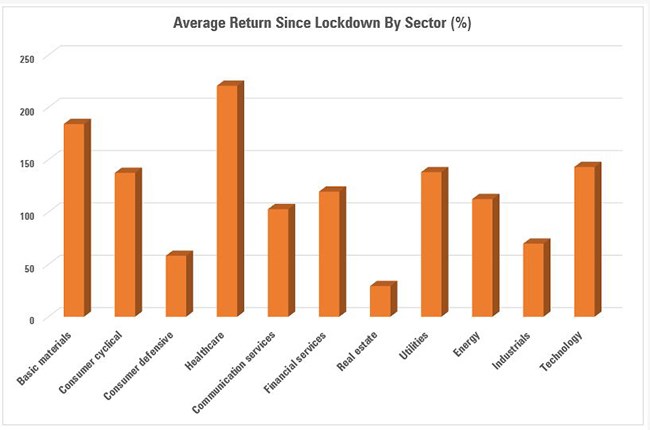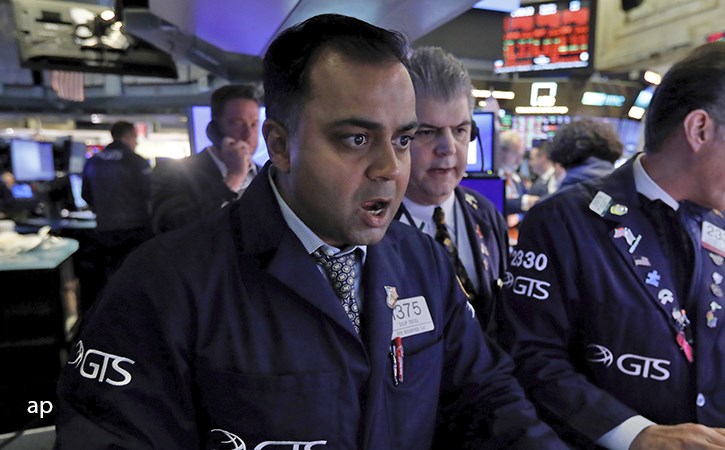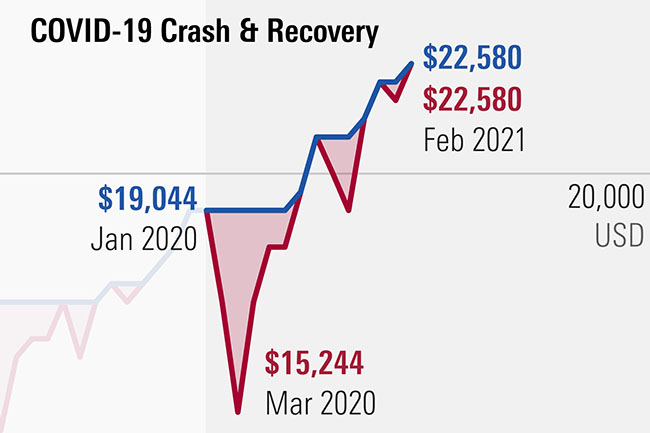
A year after the UK first went into lockdown, the stock market looks to be in much better shape. Most sectors have now rebounded from the sharp lows seen in March 2020. Globally, this was the shortest bear market in history, with many stocks recovering quickly to pre-pandemic levels.
Growth was in favour for much of 2020, but the vaccine breakthrough at the end of the year gave a boost to more economically sensitive stocks such as banks and energy firms, as investors backed a strong recovery. While the FTSE 100 and FTSE AllShare are much higher than a year ago, we’ve used Morningstar data to reveal which UK sectors have performed and which ones have lagged.
Morningstar groups stocks according to 11 sectors: basic materials, consumer cyclical, consumer defensive, healthcare, communication services, financial services, energy, industrials, real estate, technology and utilities.
Some sectors are much bigger than others. Industrials, for example, contains 244 companies from airline easyJet to Royal Mail, while there are ony 28 names in utilities. The companies covered range from FTSE 100 names to stocks on the Alternative Investment Market (Aim), whose shares tend to be more volatile. We’ve run the data from March 23, 2020 when the UK went into its first lockdown and stock markets were in crisis mode to the close of play on March 22, 2021.
Which are the Strongest Sectors?
Looking at the average return, the recovery in some sectors has been impressive indeed, especially given that the FTSE 100 is up 34% over 12 months and the FTSE All Share 40% higher. (It’s worth noting that these indices are weighted averages, which mean the largest companies have the biggest weight. The largest companies tend to be less volatile, so this puts a brake on index moves up and down).
We’ve also included the medianreturn for comparison, which shows the middle range of returns – and this is useful in such a volatile period as it takes account of the extreme risers and fallers in a sector.

By far the best performing sector, healthcare stocks produced on average a return of 220% amid the dramatic increase in investor interest during the pandemic. A number of smaller companies’ shares were drastically re-rated given the demand for life sciences and biotech companies, and many became takeover targets.
Most UK investors are focused on the largest pharmaceutical stocks, AstraZeneca (AZN) and GlaxoSmithKline (GSK), but while they dominate the sector they have struggled to make headway even despite the vaccine progress, with Astra up 9.5% in the period and Glaxo shares 5% lower over the 12 months.
There were some staggering gains in the sector, led by Zoetic International (ZOE) with a rise of 2,177% on the back of the boom in cannabis-related products. Hospital drug provider Shield Therapeutics (STX) is the biggest loser over the period, shedding 37% amid difficulties launching its iron deficiency drug in the US. The next best performing sector is basic materials with a gain of 186%, with mining stocks helped by the commodity boom as the world gears up for economic recovery.
Worst Performing Sectors
Real estate is by the worst performing sector over the time period, gaining just under 30%. The second worst peforming sector, consumer defensive, managed a return nearly double that at 58%.
UK commercial property, along with travel, has been one of the areas most affected by coronavirus control measures in the past 12 months. With offices, shops, restaurants and hotels closed over multiple lockdowns, many tenants have struggled to pay their rents.
Shopping centre owner Hammerson (HMSO) has been one of the most impacted of the Real Estate Investment Trusts (REITs) and its shares are off around 33% over the period. The stock is consistently one of the most shorted in the FTSE. The Morningstar real estate sector covers a wide range of stocks, including companies focused on residential property, which has fared much better since the crisis.
Investors in estate agent disruptor Purplebricks (PURP) have had a volatile ride in the last few years, but the shares are up nearly 120% since March 23 2020. Despite the pandemic, the housing market has remained buoyant, helped by the (recently extended) stamp duty holiday on homes under £500,000.
A Stock Picker's Market?
What conclusions can be drawn by this data? The first is that those who sold out in panic in March would have missed out on some spectacular gains. The second is that, while the UK stock market is generally unloved and its economic performance dire, there are a number of companies listed that have produced exceptional returns.
With UK index gains fairly muted compared with other markets, this backs the argument for active stock picking in a crisis year. Looking ahead, many UK value managers are hoping the rotation away from growth and defensive names towards rebound plays is a permanent fixture. Russ Mould, investment director at AJ Bell, argues the UK is at an inflexion point and many investors may now regret overpaying for growth stars like Just Eat, Ocado and Games Workshop – which were pandemic winners but are now struggling.




























